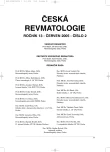-
Medical journals
- Career
Signal transduction pathways – future targets of treatment in rheumatoid arthritis?
Authors: L. Šenolt; J. Vencovský; K. Pavelka
Authors‘ workplace: Revmatologický ústav, Praha
Published in: Čes. Revmatol., 13, 2005, No. 2, p. 58-66.
Category: Overview Reports
Overview
Understanding of the role of cytokine network in inflammation has led to development of novel biological agents which have been of the major breakthrough in the therapy of rheumatoid arthritis during the last few years. More than half of the patients in clinical trials do not achieve ACR50 responses and remissions are still rare. Anti-cytokine drugs could also have serious side effects. Therefore significant efforts are focused on characterizing the signal transduction cascades that are activated by these cytokines and, in turn, regulate their expression. The most light is shed on the mitogen activated protein-kinase (MAPK), JAK/STAT and transcription factor NF-κB cascades that are pivotal regulators of expression of proinflammatory mediators. Active forms of these proteinkinases and transcription factors are expressed in rheumatic joint tissue and their proper inhibitors should provide novel therapeutic intervention in rheumatoid arthritis in the near future.
Key words:
rheumatoid arthritis, signal transduction cascade, mitogen activated protein-kinase (MAPK), JAK/STAT, transcription factor NF-κB
Labels
Dermatology & STDs Paediatric rheumatology Rheumatology
Article was published inCzech Rheumatology

2005 Issue 2-
All articles in this issue
- Evaluation of functional involvement in patients with knee osteoarthritis – validation of the Czech version of the WOMAC index
- The importance of the „first point of resistance“ to diagnostics of osteoarthritis
- Signal transduction pathways – future targets of treatment in rheumatoid arthritis?
- Reconstruction of the wrist in patients with rheumatoid arthritis
- Autologous stem cell transplantation in a systemic sclerosis patient with refractory interstitial lung involvement
- Czech Rheumatology
- Journal archive
- Current issue
- Online only
- About the journal
Most read in this issue- Evaluation of functional involvement in patients with knee osteoarthritis – validation of the Czech version of the WOMAC index
- Reconstruction of the wrist in patients with rheumatoid arthritis
- Autologous stem cell transplantation in a systemic sclerosis patient with refractory interstitial lung involvement
- The importance of the „first point of resistance“ to diagnostics of osteoarthritis
Login#ADS_BOTTOM_SCRIPTS#Forgotten passwordEnter the email address that you registered with. We will send you instructions on how to set a new password.
- Career

